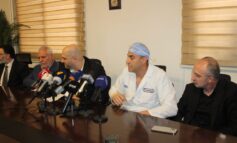Actress Angelina Jolie’s decision to go public about her double mastectomy has shone a spotlight on the issue of women at risk of cancer who have healthy breasts removed.
It is estimated that one in 300 to one in 500 women carry a breast cancer susceptibility gene mutation, known as BRCA1 or BRCA2.
Jolie announced on Tuesday she had the surgery after tests revealed she carried a genetic mutation that showed she had BRCA 1 and an 87 percent chance of developing breast cancer.
World Health Organization (WHO) figures show breast cancer kills about 458,000 people each year.
Richard Francis, head of Research at the Breakthrough Breast Cancer charity in Britain, said that Jolie’s announcement demonstrated the importance of educating women with the gene fault.
“For women like Angelina it’s important that they are made fully aware of all the options that are available, including risk-reducing surgery and extra breast screening,” Francis said.

|
| Angelina Jolie. |
Breast Cancer Campaign chief executive Delyth Morgan said that the openness of UN charity worker Jolie, whose breast cancer chances have dropped to less than five percent after the surgery, in talking about her experience would raise awareness of the disease and its risk.
Danger ‘not eliminated’
Per Hall, an epidemiology professor at Sweden’s Karolinska Institutet said that having a double mastectomy reduced a mutation-carrier’s risk by about 90 percent to a level lower than that of women who did not carry the genetic flaw.
However, Hall said that it could never eliminate the danger entirely.
“Even the most skilled surgeon will leave some tiny part of breast tissue behind,” Hall said.
The WHO said on its website that early detection remained the cornerstone of its cancer strategy and that pre-emptively screening people with no symptoms was a far more complex undertaking.
Clinical geneticist Clare Turnbull at the Royal Marsden Hospital in London said women who carried the mutation were generally offered intensive MRI and mammogram screening so any cancer could be caught and treated early.
‘Stark reminder’
“For many women particularly young women, that’s the option they choose,” she said.
“Other women feel that they would like to take a more interventional approach and try and reduce the likelihood of them getting cancer in the first place”, such as a double mastectomy.
The London-based Breast Cancer Campaign said Jolie’s openness would help raise awareness of genetic breast cancer risk.
“Deciding whether to have preventative surgery is a heart rending decision for women like Angelina but we know it’s a vital way of saving lives,” its chief executive Delyth Morgan said.
“This is a stark reminder of how much more research we need to do to give women more knowledge, choice and life-saving options to reduce their risk.”





Leave a Reply